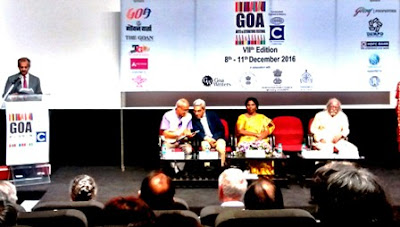Goa's lone literature festival conducted mainly in English should be doing its job to serve the cause of local literature

The small world of writers and hacks in Goa is currently divided into two opposite camps: those who are going ga ga over lit fests (including Goa's only one), and the few who are dissenters over this.
Many more might not know what to make of it, could be confused with all the claims, or are still making up their minds over the pros and cons of a lit fest like the one which concluded on the weekend in Goa.
I've been following GALF, the Goa Arts and Literature Festival, since the time it started as an idea in the mind of former International Centre Goa Director Nandini Sahai. And have ended up as a critic of how things have shaped up there. For reasons, which you, as the reader, may or may not appreciate. Other lit fests have their critics too, but for different reasons.
Over the years, the GALF has shown (i) a very low involvement and participation levels for local authors (ii) a marked trend for not reflecting the diversity of Goan writing (including diverse languages) (iii) a focus on a few privileged writers who return year after year (iv) an ability to repeatedly offer programmes focussed on big names from the big cities. Work and ideas of the latter could more easily be accessed on YouTube anyway.
As far as talk fests go, it's a good one. You can gain entry at no cost. If you're lucky to get an invite, there are free meals, song and dance thrown in too. So, why complain?
But when it comes to intent, the question that could be asked is: what is the purpose of such events? Is it meant to 'educate' local readers about the importance of writers from Big City India? Is the focus on avoid controversy, and not take up issues that matter (from the world of non-fiction)? Is it to keep track of work that Goa is producing?
For sure, the event cannot claim that its goal is to promote writing from Goa; because it does a very good job of not doing that. Names of a handful of local writers might show up in the programmes. Some from the "margins" (like the North East or troubled Kashmir) are also at times included. But, over time it becomes clear that these are mere 'fillers' to the main event.
At the end of the day, it might seem parochial to make a case for local writing. Before it comes across wrongly, let me assure that this is not an argument for getting invites either. This columnist has got a fair share of invites to GALF over time; and there's only that much one can say before one starts to repeat oneself....
But there is definitely a case to be made out that Goa's lone literature festival conducted mainly in English should be doing its job to serve the cause of local literature.
Goan writing is rich and varied. As far as the State goes, it is authentic to the local region. But we can't wait for Bombay, Delhi, Lisbon or London to start promoting it. That has to be begin locally.
Promoting local literature in a literature festival is important for a number of reasons. Local literature reflects the history, traditions and unique perspectives of a region. So does Goa's. Showcasing it helps preserve and strengthen Goa's cultural identity.
It encourages local writers, many of whom might not yet have 'mainstream' or 'national' recognition. Local literature helps build a greater connect with the region. It makes the event more inclusive and relevant.
Similarly, it enriches literary diversity; as it is, Goa writes in so many languages and scripts. Even dialects need to be encouraged. Local cultures can boost language and literature where it is needed most. A literature festival can help revive interest and pride in them. It can even encourage translation and wider readership.
For big national names, there are many other platforms. But if these authors are to be further hyped at the cost of depriving the not-so-big names, then an injustice is being done to the latter.
Over a decade ago, this columnist had similar misgivings. So, I approached the authorities asking a number of questions. Such as: who was deciding matters of GALF, the expenditure each year, sources of income and sponsorship or grants, participants attended in each year, names of participants invited (including repeat participants), sponsorship received each year, surplus/deficits on an annual basis, whether any priority was given to local authors, and the criteria on which speakers were being invited.
At that time, the International Centre Goa simply replied by saying they were not covered by the Right to Information Act, and refused to give details. That says a lot.
The questions remain. Quite a few might feel alienated by the definition of literature to mean "something written by others" or "something created in Big Cities by authors who make it to the headlines". But the caravan continues.
In the book "Colonialism, World Literature, and the Making of the Modern Culture of Letters", Baidik Bhattacharya examines how colonial histories have fundamentally shaped modern global literary culture since the eighteenth century.
Bhattacharya argues that the modern concept of literature as an autonomous and sovereign realm was co-produced with colonial sovereignty, particularly through the administrative practices in British India.
He shows how colonialism has shaped the evolution of 'literary cultures'. By exploring diverse sources -- colonial archives, German aesthetic philosophy, French realist novels, and English literary history -- Bhattacharya offers a comprehensive account of how colonialism has influenced the formation and transformation of modern literary practices.
If some distant area rules, it's called colonialism. In the case of literature, when the priorities and tastes of some distant, Big City, dominates the local ones, I'd call it 'literary colonialism'.